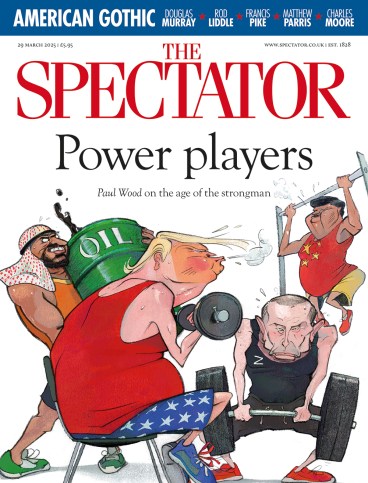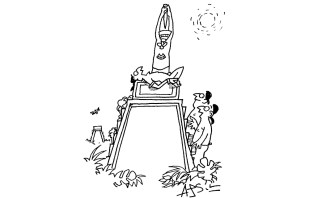
Harold Wilson once declared that the Labour party ‘is a moral crusade or it is nothing’, a proposition whose logical consequence is troubling. Returning now from the United States, the comparable proposition both haunts and comforts me, because America is not nothing.
Travelling through several Midwest and western states, I’ve been struck by how many Americas there are even in one region, how different they are and how, like the individual wooden staves of a great barrel, they depend upon the metal hoops that bind them. If the hoop stays strong, tight and in place, the construction is formidable. Loosen that steel belt, and the staves fall into a useless clutter.
The central hoop of the American barrel is, I think, the moral idea of America. Dislodge the idea, and the rest will not hold. America is a moral idea or it is nothing.
I travelled by train, the California Zephyr, which runs from Chicago to San Francisco, a two-day, 2,438-mile journey. I joined in Denver, Colorado. From brown plains to snowy peaks, our track left the skyscrapers of Denver and climbed over the Rocky Mountains. We passed the ski slopes, then clattered down the gorges of the Colorado River. In the twilight now, we gathered speed through immense red and yellow deserts, approached the Great Salt Lake, then squealed to a stop before midnight in Salt Lake City, Utah.
But that’s the geography. How about the people? As diverse. Denver’s seem young and techie. The scent of marijuana is on the breeze and the coffee is good. There’s money and new business here, small city apartments are priced in millions and I shopped for swimming trunks in an outdoor store that felt as big and high as Kensington Olympia, crowded with sporty people kitting themselves out for snow, mountain and river – and I felt very old.
But as the train left Denver’s commuter environs the picture changes. Trackside houses became wooden and small, some little more than shacks. Trailer parks abound. After crossing the mountains and ski resorts the railway levels out into even poorer farming and mining country where the land looks barren, and coalfield settlements like Price, Carbon County, Utah, put on a brave show of neon – but you can tell people struggle.
What a contrast with Salt Lake City, where we disembarked: a stately state capital with surely the widest streets on the planet. It breathes business success. Though only about half the population are Mormons, this is the spiritual centre of their Church of Jesus Christ of Latter-day Saints, a faith whose founding tenets strike me as no more preposterous than those of our own national religion, and whose adherents work hard and seem to do well. ‘We employ Mormons when we can,’ a (non-Mormon) fellow passenger told me. ‘They’re more reliable.’
From Salt Lake City to Flagstaff, Arizona, we drove. It gets poorer as you go, and more Latin. In one roadside Mexican restaurant the waitress’s English was halting. Crossing into Arizona, you could sometimes feel that English was America’s second language, and in one queue for coffee I was able to translate one American’s Spanish into English for her anglophone fellow American. We visited a bizarre (and fun) outdoor hot springs: all ponytails, wind chimes, scented candles and trailer homes in classic buses. Flagstaff itself was another America, too: low-rise, early 20th-century buildings, trendy cocktail bars, university students and the hoots of passing mile-long freight trains all through the night.
For all their mistakes, Americans’ eyes are uplifted. They want to believe their country is on the side of Right
Our own night train, the Southwest Chief, bound for Los Angeles, took us through desert mountains to yet another America: the Pacific breezes of a Los Angeles morning. We hired a car. From here, Venice Beach is not far up the coast: imagine Brighton with no beggars, on double the median salary, with driverless taxis, stylish clothes shops and smart restaurants on every corner.
I’ve described a journey across what’s really only a corner of the continent, seen mostly from a train. I describe the tremendously varying means and jobs and dwellings of tremendously different types of American. Nor was this sample uncharacteristic: you will find more striking differences elsewhere in America. And yet it all feels like one nation, one people, one country. What, then, unites the apparent miscellany?
From the rickety railings of the poorest cabins to the lawns of the grandest mansions, you will see the American flag. Everywhere, the stars and stripes flutter. A cheap hotel’s hoarding describes itself as ‘Veteran-owned’.

This pride in country goes deeper than pride in wealth or power. It is more than America the Great; it is America the Good, a people built from peoples who have escaped, turned their backs on something: sometimes poverty, often persecution, but almost always a world that had gone sour for them. The new start, the optimism you everywhere encounter, is not just economic, it is moral.
This does not mean Americans think their country is without sin or can be accused of no crimes. It means that for all their mistakes, Americans’ eyes are uplifted. They want to believe their country is on the side of Right. That is the iron hoop that binds this barrel. Without moral self-respect, the American mainspring would snap.
It is for this reason I believe the cynicism, the whiff of impropriety, the sense that coming out on top is all that matters in the end, the amorality that infects Donald Trump and Trumpism, is profoundly un-American. Trump knows this. Hypocrisy, they say, is the homage vice pays to virtue – and that’s why this President confects grievances and injustices to sell his aggressions to the American people. He may carry them with him for a while, but beneath the surface, doubt will swell. The doubt that will in the end undo Trump will be moral doubt within what, beneath all the boast and strut, is a moral nation or it is nothing.









Comments